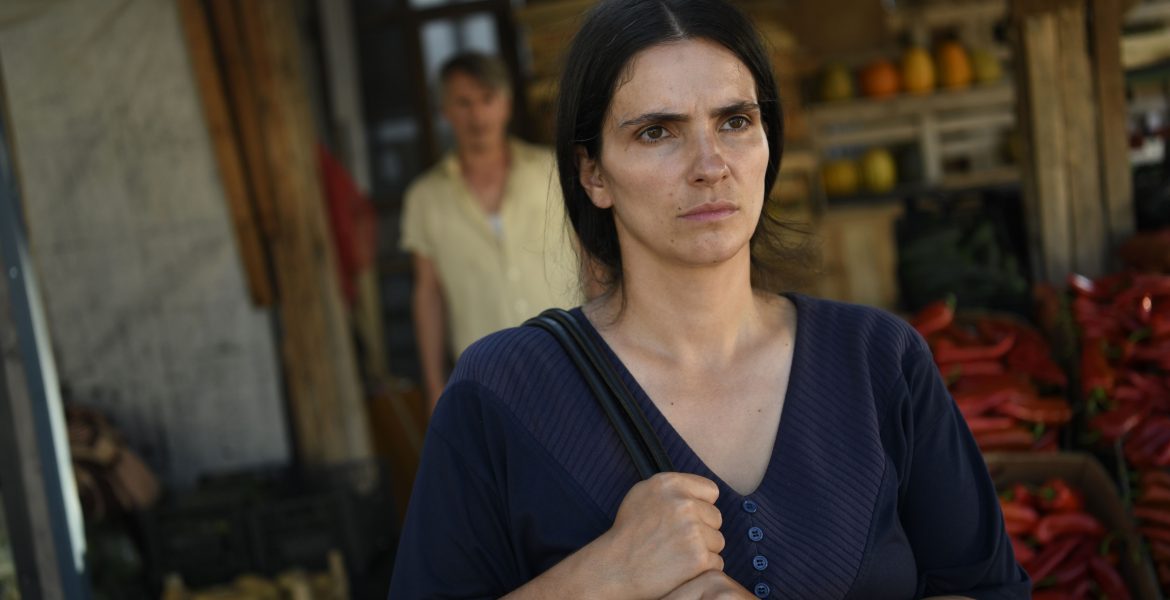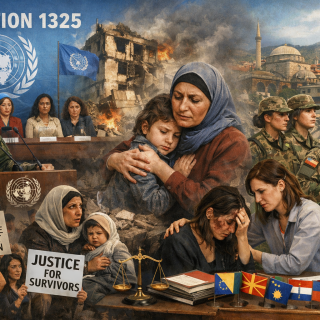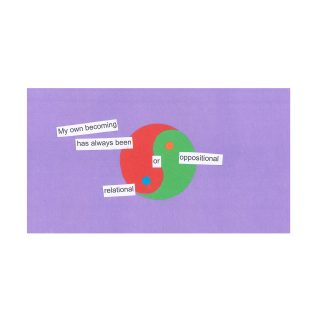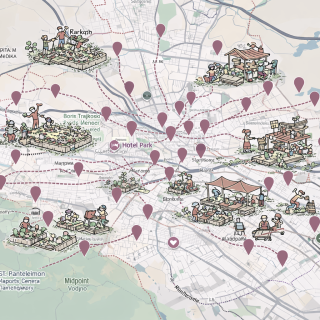The massacre in Velika and Mala Krusa near Orahovac took place during the war in Kosovo.
On March 25 and 26, 1999, two days after the NATO bombing of the Federal Republic of Yugoslavia (FRY) began.
According to the Humanitarian Law Fund http://www.hlc-rdc.org/?p=13109
On March 25 and 26, 1999, 114 Albanian men were killed.
On the occasion of marking 24 years since the crime in Kruša, we spoke with Blerta Basholli, a screenwriter and director from Kosovo. Her brilliant film “Hive” (2021) won all the awards at the Sundance Film Festival, including the Main Jury Prize, the Audience Award and the Director Award. Well deserved, because it offers a unique view of post-war societies in the region we live in.
SF: So, Blerta, can you please tell me what was your direct inspiration for this story? It’s based on a real woman, Fahrije, and her life, right?
BB: Yes. Well, initially I heard Fahrije’s story on TV, she was giving an interview about the missing people, how she had lost her husband during the war and how many other people were also gone missing from her village.
And then talking about the business and the obstacles she had and it sounded really interesting. Although I had heard about Fahrije and the women of Krusha before, I never heard about her obstacles and her difficulties with the society. I was in New York back then. When I came back to Kosovo, I went to meet her, and just meeting this incredible woman in person was a true inspiration.
So, I loved the story from the first moment that I heard it. But then meeting her in person was really like when something blows your mind, and you’re, like, oh my God, this is a great story and the character is also very interesting and powerful.
SF: How is she in person? She’s a real survivor in the film.
BB: She’s very funny, I must say. First of all, I mean, she was in Lisbon as well that we showed the film here. I love her. I even like traveling with her. She’s like a friend of mine now. We’ve done several traveling together with festivals and she’s great. I mean, she’s very practical. She’s a practical person. Even when we met her about the, she was very simple. We want to make a film about you. Okay? Are you okay with it? To give us the rights? Fine. She makes decisions. And I really like that about her. She didn’t get any formal business education, but she’s really a businesswoman. She makes decisions and she moves on. Even her face is just like, really strong and powerful.
SF: So do women have to be strong in that kind of masculine way to survive in patriarchal societies?
BB: I think they do. The other day she was here with another woman, and she never told me before about this, but I kind of noticed it. And I tried to portray that with Yllka (Gashi, the actress who portrays Fahrije in the film) as well, in “The Hive”, the fact that she wanted to look a little bit like a man. She was dressing up in clothes that really didn’t show her feminine side. She puprosefully didn’t want to be “attractive”, she had to do business, to deal with men. I didn’t want to use that kind of symbolism, but it is also true that she cut her hair so that she would look more manly.
SF: So in a way, she has to be even better than a man should be in her position in order to succeed in this society of men. I guess it is the very truth in the film and also in the reality we live.
Does she mention the past, the loss of her husband to Serbian soldiers? And if she does, how often does she mention the past in personal conversations?
BB: Not so much, but, for example, these women gathered together primarily for work, but they also spoke with each other about the past. So, she was a little bit like a psychologist to the these other women, who all had similar experiences. When they would gather, they would cry and talk, and there were women who witnessed their children being murdered in front of them, or taken away, and that’s really a difficult thing to go through.
And of course, those women would cry every time they would talk about it. But Fahrije tried to have them forget. So she would play music and have them dance. She talks, but she doesn’t talk much anymore because she cannot handle it. She’s a little bit older now and she doesn’t want to watch the film anymore, for example. At this screening in Lisabon, someone asked her a question, which was very interesting for this topic. He told her, if you would go back again, would you have done anything different? And she was like, I don’t ever want to go back again. I was young. I had to survive. I had children to raise, and I had no other choice. So I had to gather my strength and move on. But I don’t even want to think about ever going back there again.
So that was, for me, really interesting because she didn’t even want imagine going through everything she went through again. Even just as an imagination. I can understand that.
SF: And that is, actually, that’s one of the main reasons I really loved the film, because it’s, in my opinion, finally an honest film from our generation.
It’s a film about what happened in the past, and we must know that these horrible things happened. But what will we do now? What can we do next? How can we go on with our lives, from that point, which seems so bleak and so desperate. And there have been many films and books and art about moving on, especially after the Second World War, but “Hive” has a quite unique perspective, primarily because it’s a woman’s perspective. A woman alone, in a patriarchal society, even more isolated. And all that more brilliant for all she did, because she practically figured it all out by herself – how to survive, how to go on.
So what I also wanted to ask you – I was born in 1981, you were born in 1983. But there were two completely different childhoods. And growing up, I guess the first time I knew about, I realized the scope of the war crimes that Serbian troops did in Kosovo was when Prime Minister Đinđić’s government revealed the documents about that truck with the bodies near Batajnica. And that was really horrible. And a lot of people here were sort of lying to themselves, hiding from the truth about what was happening for years in Kosovo. And then this happened, and I watched a lot of people change their opinion, finally realizing what side their country was on. And that was, like, the switching point for many people in Serbia.
But on the other hand, now we have a nationalist government and they’re all going back. They’re denying the war crimes. They’re not telling people why the bombing in 1999. happened. And we have generations of young people who don’t know history, and they’re open only to nationalist indoctrination.
How do we fight that? What do we do with that?
BB: I think by telling the truth. But, both sides. The truth needs to be heard from both sides. You were pretty open from the first time you’ve seen the film, and you loved it and embraced it. And I was really relieved and glad. As I told you, I was not very comfortable being in Belgrade because of… well, everything. I didn’t know what to expect or how to feel or what to say. I was really stressed, and luckily you were there and we had a nice conversation and it went well.
But we really need to tell the truth because not everybody will accept my film the way you did. And by everybody, I mean not just people in Serbia, but in every country. Nationalism is something that touches minds much faster than the truth about something that you’ve done wrong, or what has your country done. Even people in Kosovo. It was in cinemas for six months. I think we broke every record, if I’m not mistaken, at the box office. But at the same time, there were people saying – you’re portraying Kosovo badly. And I’m like, yeah, but it’s true, and sometimes truth hurts. I do want to make a film about how great we are and how we don’t have patriarchy. How all of us helped these women? But, that wouldn’t be true.
Fahrije now has a factory. All from private sponsors. Not a single penny from the government. She helped the whole village recover. Not just herself. The whole village recovered, and it’s rebuilt, and every house was burned in that village, and so many people were gone. So it was really difficult to rebuild.
But I think nationalism really gets people, same as fake patriotism, because when I think about patriotism I think about telling the truth, helping the society understand the truth. Even if it’s ugly. It happened. You’re not proud of it. And we need to accept it, acknowledge it, because we need to move on. And people in Serbia, I’m sure, like yourself and many others, want to get over with it.
You want to accept it, acknowledge it, recognize each other. Let’s move on with our lives. Let’s do better things than to make a dialogue about are we accepting you or not accepting you, or who is better than who.
So, for me, it is really about telling the truth. Like you’re doing, writing an article, making a film, just really not being afraid to say something because, you know, people really don’t know the truth.
People really should be brave about coming up and changing the image of the country because younger generations won’t know. They just know what’s in main news.
SF: Yes, I absolutely agree. I think the truth is the only way and that’s the only brick that we can build the road from.
But unfortunately, as you know, a lot of our colleagues say, oh, I don’t want to deal with politics, I want to deal with other issues. And they’re sort of pulling the brakes when it comes to speaking openly about politics.
On the other hand, I always felt it was my duty if I am doing the films about these subjects, then I have to also be engaged in some kind of public conversation about it. And so it all sort of creates that bridge that we should be creating as artists.
And those bridges towards most of the former Yugoslav republics have been rebuil, mostly, especially among the artistic community. We all collaborate, work in the same cultural space. I think the most work we need to do now is being true to ourselves and then giving a hand and building some kind of a bridge with our colleagues from Kosovo, because that’s the only way as the countries are neighbors, and we are all hopefully one day going to be in European Union.
I don’t know, but I feel that art can actually do that. Do you think we do make a difference?
BB: Of course, it does. I traveled a lot with “Hive”, and spoke to people, and it affected folks differently in different countries. I mean, it’s the same film. And of course, it’s going to mainly affect women, because of women empowerment themes, and so on and so forth. But like in US, people were affected by the sense of community the protagonists created for themselves, because the film was screened in Sundance during the Covid pandemic, and it made people feel even more isolated.
So, even a “small” film can be powerful, if it can raise a discussion. And we always have to be careful not to produce more hatred because we’ve hated enough.
I’m now writing a film about the way we lived in the 90s. I mean, I was born, as you said, in Priština in ’83. and from my second year at primary school, the schools were separated, Serbians in one side, Albanians in the other. And we had a different entrance in the school. High schools were completely segregated, so some children stayed at home to learn. Old books were being passed from generation to generation and it wasn’t a good sometimes if they catch you with books in Albanian, the police would cause your problems.
Even when I’m writing about it, I’m like oh my God, did we really live like this? Did we hate so much? Did the lady who worked at Žitopromet really refuse to give me the bread, if I didn’t ask in Serbian? And she was our neighbor. She was living in the same building. So it was like a weird, weird kind of situation. But, even when talking about that period, I really don’t want to create more hatred. We just need to talk about it. We need to be honest about it, tell the truth, and accept each other’s truths, and then be able to openly talk about it without tension.
And it takes time. It’s hard. Nobody wants to tell you that, hey, you killed my people. You were the enemy or the bad guy. And also, I also understand for people who cannot talk without hatred because they suffered a lot.
But for example, Fahrije, she accepted a photographer and an interview from Serbia, although she had gone through so much, maybe, in a way, that is the reason she of was more open to talk. But there are, also, towns like Đakovica who don’t let Serbians enter for a holiday to go and visit a church. And they lived in that village.
And in a way, you kind of understand those people on both sides who suffered a lot, but then there are we, who may be able to start these conversations. And then, bit by bit, everybody will be able to talk, talk without tension and without hatred and just really be able to accept – it happened, it was wrong, how can we deal with it?
SF: Yeah, those are the key questions. And I think in your film, you tell the truth. But it’s only love that you give us from the film. At least I got only love, only forgiving, only acceptance, only paths how to move on.
So that’s why I guess, it works, the art can really make those bridges. My second film was about these ultra-nationalist hooligans on the football stadiums, and their connections with government, and how the right-wing politicians and the police are using them, and so on.
And we had a pre-premiere in New Zealand in Park Road Cinema, Peter Jackson cinema, where they did Lord of the Rings. And I was terrified. I mean, in Serbia we got death threats from the right-wing lunatics, and had police at the premiere, and all that shit. But I was more scared of the New Zealand screening, which was before the Serbian premiere, because I thought the Kiwis would never understand the film. It’s so local, it’s so European. It speaks openly about all these very local political issues. And New Zealand is like this wonderful, peaceful little country on the other side of the world. But in the end they did get it. And the Q & A session lasted more than the film, people got very emotional. So, I think this is the way, to quote The Mandalorian, because I love Star Wars so much.
Obviously, these films can break barriers and can communicate. And if somebody from the audience approaches it with an open heart, he or she will get love back from these kinds of films.
BB: These films really touch people, and make us feel, which is what theorists always wanted to analyze. Why does a film move us? Why do we keep watching films? Why do we like watching films? Because a film really makes you feel something and moves you. Either gives you hope or moves you emotionally or really takes you with it. And that’s why it’s so powerful. And that’s why I believe I agree that not everybody needs to make a political statement. I understand that not everybody wants to raise a discussion with their own work. But at the same time, the best advice that I got from a teacher, and I always mentioned this, he said, if you have a chance to do a good thing with your work, use the chance to do it.
Because film is very powerful. And I think it’s the best advice I ever got, because I thought it was such a simple thing. Yeah, whatever, of course. But then it got me. After I made this film, it really got me, because I was like, yeah, I do want to make a change. I want to make films. I want to tell important stories. But if I just make people think about something, I did something good.
Spoke with Blerta Basholli:
Stevan Filipović, screenwriter, director and professor. He is best known for films such as Šejtanov ratnik (2006), Šišanje (2010) and Next to Me (2015), which achieved notable success in cinemas, dealing with social issues with elements of fantasy.
In addition to his creativity, Filipović was also an assistant in the class of actress Mirjana Karanović at the Academy of Arts in Belgrade between 2012 and 2014. After that, he started teaching the basics of visual effects and digital post-production at the Academy of Arts.
Since 2020, he has been working at the Faculty of Dramatic Arts in Belgrade.




